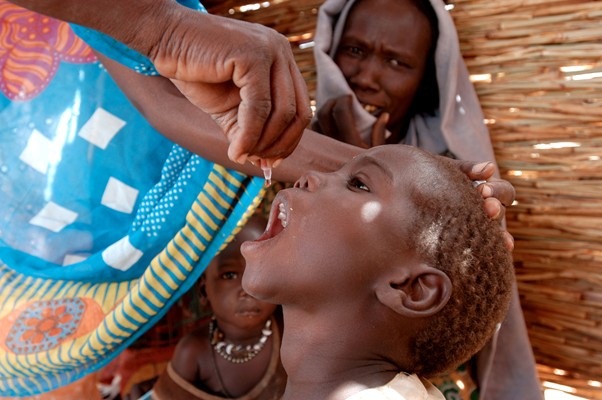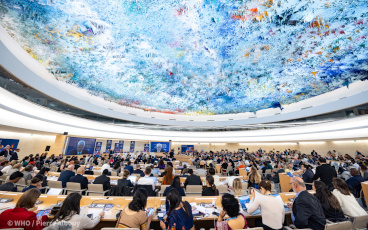Risk of polio from Chad is high
Hajj-related travel may accelerate spread.

9 June 2011 – Chad is experiencing outbreaks of both wild poliovirus type 1 (WPV1 – 65 cases in 2011) and wild poliovirus type 3 (WPV3 – three cases). The WPV3 outbreak has been ongoing since November 2007, while the WPV1 outbreak began in September 2010 as a result of a new importation virus from northern Nigeria. Originally restricted to the greater N’Djamena area, the WPV1 outbreak has been intensifying in 2011, spreading to other areas of the country.
The Independent Monitoring Board (IMB), set up at the request of the World Health Assembly in 2010 to independently monitor progress towards a polio-free world, in April 2011 called the situation in Chad a public health emergency, highlighting that – more than any other country – Chad represents a scenario of the greatest urgency. Given the uncontrolled and widespread geographic transmission of both WPV serotypes, historical spread to neighbouring countries, recent geographic expansion of WPV1 across Chad (including close to the borders with CAR and Sudan), the World Health Organization (WHO) rates the risk of further international spread as high.
With the Hajj (pilgrimage to Mecca, Kingdom of Saudi Arabia) expected to begin in early November and Ramadan in early August, it is anticipated that pilgrims are now beginning to move across west and central Africa, further increasing the risk of polio spread. The Kingdom of Saudi Arabia last month issued polio vaccination requirements for travellers to the Hajj. WHO recommends that all travellers from polio-infected areas be fully vaccinated prior to travel.
In 2010 and 2011, Chad’s outbreak response vaccination activities had been inadequate to stop transmission. More than 20% of children have been regularly missed during supplementary immunization activities (SIAs) in some high-risk areas (including the greater N’Djamena area); in other areas, the quality of SIAs cannot be verified by WHO due to inadequate independent monitoring. Additionally, subnational gaps remain for surveillance of acute flaccid paralysis (AFP), and further undetected circulation cannot be ruled out. Urgent improvements are needed during SIAs, through strengthened engagement and ownership for SIA operations by provincial- and district-level political and administrative leadership.
To urgently address the situation, the Government of Chad with the technical support of partners has just finalized a 6 month national polio emergency plan. National Immunization Days (NIDs) using bivalent OPV have been conducted in May, with further SIAs planned for June. The Government of Chad and partners are working to ensure that technical support is allocated to priority areas; special strategies will be used to reach high-risk populations and technical capacity to fill subnational surveillance gaps will be scaled up. As part of efforts to increase accountability for programme implementation, key indicators will be regularly monitored. Under the National Polio Emergency Plan, heads of district administrations will be charged with overseeing implementation reviews following each SIA, and providing summaries with clear outcomes and recommendations to provincial governors, whose offices will oversee direct oversight of the operationalisation of the plan. At the national level, monthly implementation reports will be prepared by the Ministry of Health and shared with the office of the Prime Minister.
Throughout 2010 and 2011, countries neighbouring Chad – notably Cameroon, CAR and Sudan – have all conducted multiple SIAs, to minimise the risk of re-infection. It is important that countries across central Africa and the Horn of Africa strengthen AFP surveillance in order to rapidly detect any poliovirus importations and facilitate a timely response. Countries should also continue to boost routine immunization coverage against polio to further strengthen population immunity and minimize the risk of any importation.
As per recommendations outlined in WHO’s International travel and health, travelers to and from Chad should be fully protected by vaccination. Travelers to Chad who have in the past received three or more doses of OPV should be offered another dose of polio vaccine before departure. Any unimmunized individuals intending to travel to Chad require a complete course of vaccine. Travelers from Chad should have a full course of vaccination against polio before leaving Chad, with a minimum one dose of OPV before departure. Some polio-free countries may also require travelers from Chad to be immunized against polio in order to obtain an entry visa.













